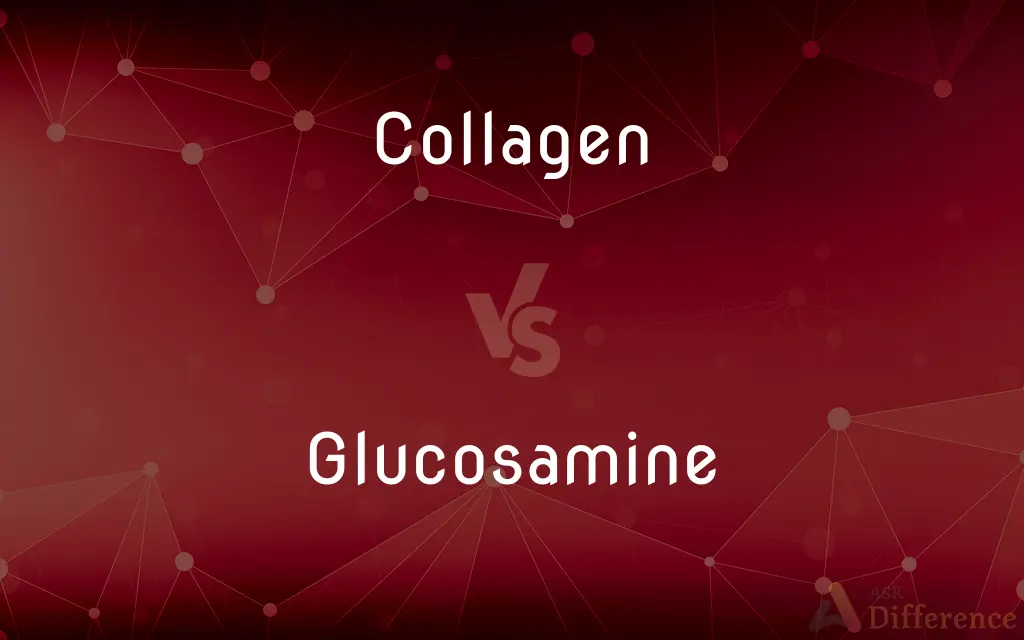Collagen vs. Glucosamine — What's the Difference?
By Tayyaba Rehman — Updated on October 28, 2023
Collagen is a protein found in skin and connective tissues; Glucosamine is a compound aiding joint health and cartilage formation.

Difference Between Collagen and Glucosamine
Table of Contents
ADVERTISEMENT
Key Differences
Collagen and Glucosamine are both naturally occurring substances in the human body, but they serve different functions. Collagen is the primary structural protein in skin and connective tissues, giving them strength and elasticity. On the other hand, Glucosamine is a sugar compound that helps in the formation and repair of cartilage, especially in joints.
Both Collagen and Glucosamine have become popular dietary supplements for different reasons. While Collagen supplements are often sought for skin health, anti-aging, and wound healing, Glucosamine supplements are commonly consumed to support joint health and potentially alleviate joint pain.
Although Collagen primarily exists in skin, tendons, ligaments, and bones, Glucosamine is most abundantly found in the fluid around the joints. The former ensures structural integrity, while the latter ensures the joints function smoothly without discomfort.
In the world of skincare and beauty, Collagen is frequently mentioned due to its role in maintaining skin elasticity and preventing wrinkles. Glucosamine, however, is less associated with skincare and more with joint comfort and mobility, especially as one ages.
While both Collagen and Glucosamine can be sourced from natural foods, they are also available in supplement form. Collagen is often extracted from animal tissues, whereas Glucosamine is typically derived from shellfish or produced synthetically in laboratories.
ADVERTISEMENT
Comparison Chart
Primary Function
Structural protein in skin and connective tissues.
Aids in cartilage formation and repair.
Popular Use
Skincare, anti-aging, and wound healing.
Joint health and alleviating joint pain.
Main Locations in Body
Skin, tendons, ligaments, bones.
Fluid around the joints.
Supplement Source
Extracted from animal tissues.
Derived from shellfish or produced synthetically.
Role in Body
Ensures structural integrity.
Ensures joint comfort and mobility.
Compare with Definitions
Collagen
A common ingredient in skincare and beauty products.
This cream contains Collagen to enhance skin hydration.
Glucosamine
A sugar compound beneficial for joint health.
Some take Glucosamine supplements to relieve joint pain.
Collagen
A protein crucial for skin elasticity and strength.
Aging can reduce the body's Collagen production, leading to wrinkles.
Glucosamine
Assists in cartilage formation and repair.
As we age, our body's natural Glucosamine production can decrease.
Collagen
The main structural protein in various connective tissues.
Collagen gives tendons and ligaments their tensile strength.
Glucosamine
Often paired with chondroitin in joint supplements.
This supplement contains both Glucosamine and chondroitin for comprehensive joint support.
Collagen
A component vital for wound healing and tissue repair.
Collagen dressings can accelerate the healing of certain wounds.
Glucosamine
A compound present in the fluid around joints.
Glucosamine levels in the body impact joint mobility and comfort.
Collagen
Found in abundance in animal tissues like bones and skin.
Bone broth is a natural source of Collagen.
Glucosamine
Commonly sourced from shellfish for supplements.
Those allergic to shellfish should be cautious with Glucosamine supplements.
Collagen
Collagen () is the main structural protein in the extracellular matrix found in the body's various connective tissues. As the main component of connective tissue, it is the most abundant protein in mammals, making up from 25% to 35% of the whole-body protein content.
Glucosamine
Glucosamine (C6H13NO5) is an amino sugar and a prominent precursor in the biochemical synthesis of glycosylated proteins and lipids. Glucosamine is part of the structure of two polysaccharides, chitosan and chitin.
Collagen
The main structural protein found in skin and other connective tissues, widely used in purified form for cosmetic surgical treatments
She was given a collagen injection to smooth out wrinkles in her forehead
Vitamin C plays a vital role in the formation of collagen
Glucosamine
An amino derivative of glucose, C6H13NO5, in which an amino group replaces a hydroxyl group. It is a component of many polysaccharides and the basic structural unit of chitin, and is used as an over-the-counter dietary supplement alone or in combination with chondroitin for treatment of joint pain in arthritis.
Collagen
Any of a class of extracellular proteins that are composed of three coiled polypeptide chains, form strong fibers, and are the main constituents of cartilage, bone, and other connective tissues in animals.
Glucosamine
(biochemistry) An amino derivative of glucose that is a component of polysaccharides such as chitin; it is marketed as a dietary supplement supposedly to reduce the symptoms of arthritis.
Collagen
Material composed principally of collagen proteins. Collagen is converted into gelatin when boiled in water.
Collagen
(biochemistry) Any of more than 28 types of glycoprotein that form elongated fibers, usually found in the extracellular matrix of connective tissue.
Collagen
The chemical basis of ordinary connective tissue, as of tendons or sinews and of bone. On being boiled in water it becomes gelatin or glue.
Collagen
A fibrous scleroprotein in bone and cartilage and tendon and other connective tissue; yields gelatin on boiling
Common Curiosities
From what sources are Glucosamine supplements typically derived?
Glucosamine is often derived from shellfish or produced synthetically.
How does Glucosamine support joint health?
Glucosamine aids in the formation and repair of cartilage, ensuring smooth joint function.
Where is Collagen primarily found in the body?
Collagen is mainly present in the skin, tendons, ligaments, and bones.
Can both Collagen and Glucosamine be taken as supplements?
Yes, both are available as dietary supplements for skin health and joint health, respectively.
Are there vegetarian or vegan sources of Glucosamine?
Yes, there are synthetic or non-animal-derived Glucosamine supplements suitable for vegetarians or vegans.
Do the body's natural levels of Collagen decrease with age?
Yes, Collagen production typically declines with age, leading to signs of aging like wrinkles.
Why might someone take Glucosamine supplements?
To support joint health, alleviate joint discomfort, and potentially slow cartilage degradation.
Can Collagen be found in foods?
Yes, foods like bone broth, fish skin, and certain cuts of meat are rich in Collagen.
What is the main role of Collagen in the body?
Collagen is the primary structural protein in skin and connective tissues, providing strength and elasticity.
Why is Collagen popular in skincare?
Collagen maintains skin elasticity and can help prevent wrinkles and sagging.
Is Collagen only beneficial for the skin?
No, Collagen also supports the health of tendons, ligaments, bones, and more.
Can people allergic to shellfish take Glucosamine supplements?
They should be cautious, as many Glucosamine supplements are shellfish-derived. However, synthetic versions are available.
Is Glucosamine only beneficial for older individuals?
While often associated with aging joints, anyone seeking joint support or experiencing joint discomfort might benefit from Glucosamine.
How does Collagen benefit wound healing?
Collagen plays a vital role in tissue regeneration, making it beneficial for wound healing.
Are there any known side effects of taking Glucosamine?
Some people might experience digestive discomfort, but generally, Glucosamine is considered safe. Always consult a healthcare professional before starting any supplement.
Share Your Discovery

Previous Comparison
Limestone vs. Marble
Next Comparison
Usucapion vs. UsucaptionAuthor Spotlight
Written by
Tayyaba RehmanTayyaba Rehman is a distinguished writer, currently serving as a primary contributor to askdifference.com. As a researcher in semantics and etymology, Tayyaba's passion for the complexity of languages and their distinctions has found a perfect home on the platform. Tayyaba delves into the intricacies of language, distinguishing between commonly confused words and phrases, thereby providing clarity for readers worldwide.















































